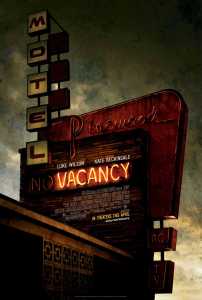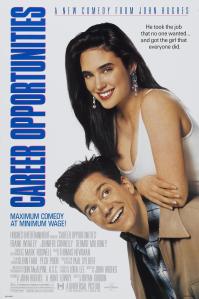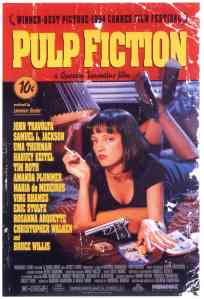Director: Nimród Antal
Starring: Luke Wilson, Kate Beckinsale, Frank Whaley, Ethan Embry
You would think that, by now, horror movie characters would be wise enough never to stay the night in some cheap, middle-of-nowhere motel. They certainly had not as of 2007. “Psycho” will be foremost on most viewers minds when tuning in to watch “Vacancy.” But the comparisons both begin and end with the film’s setting. The actual plot of “Vacancy” plays out more like a home invasion angle, except that the home in question is the villains’ domain, and it’s up to the protagonists to figure out all of its little nooks and crannies.
David (Luke Wilson) and Amy Fox (Kate Beckinsale) are a estranged couple whose marriage has never recovered from the tragic loss of their son. Not even reaching the violent part of the story, and already the film is taking a downbeat tone. On their way back from some family get-together, their car breaks down in the middle of nowhere (i.e. where their cell phones are of no use). They had stopped at an auto repair garage, but the friendly mechanic (Ethan Embry) appears to have not found the car’s actual problem. Making their way back on foot, the Foxes decide to stay the night at the motel across the street from the garage. Immediately, they can hear a woman’s screams coming from the office, which the motel’s manager (Frank Whaley) insists are coming from the TV. The manager, who looks like a cross between Ned Flanders and Walter White, offers the honeymoon suite. But all that Amy and David really want is a place to get some sleep.
Once in their room, which is as disgusting as one can imagine, the couple is prevented from resting by someone in the adjacent room banging on the walls and the doors. The phone keeps ringing as well. Unwilling to put up with such harassment, David goes to the manager to inform him of the situation. At first, his story is met with confusion, as there are allegedly no other guests booked for the night, but the manager swears to look into it. No longer sleepy and bored out of his mind, David notices the stack of VHS tapes on top of the TV (which does not appear hooked up for cable channels). Each tape is unmarked, and contains on them scenes of unspeakable violence. Amy demands that the TV be turned off, but something about the tapes has caught David’s attention. It’s not the scenes of violence, but the location in which they are filmed… right inside the very room in which David and Amy are staying!
Finding cameras hidden throughout the room, they realize that their every move is being watched, and that they are the intended victims for the next snuff film. They try to run, but find men in masks waiting outside. Returning to the room, Amy attempts to distract the men while David bolts for the pay phone outside. But David quickly discovers that the phone is connected to the motel’s front office, and exits the booth just in time as the masked men crash into the booth with their car. With David now back in the room, they hear a truck pull up in the parking lot and try to get the driver’s attention. But David and Amy soon come to realize that the driver is a customer who is there to pick up copies of the videotapes. Realizing that they won’t find help from outside, David and Amy continue to work on a plan of escape. David starts to think about how the killers on the video seem to appear out of nowhere and figures out that they’ve been using a system of trapdoors. One of these tunnels up through their motel room’s bathroom floor.
Using the tunnels, David and Amy make their way over to the main office, where they find the manager’s surveillance system and a working phone. But they don’t get very far with the emergency call before they have to bail, leaving the phone off the hook, thus alerting the manager to their presence. He sends the masked men into the tunnels to go after them, forcing them to follow an alternative route. This leads them across the street to the garage, where they barricade the trapdoor with a heavy shelf. Just then, a sheriff’s deputy arrives in response to the emergency call. Asking the manager to allow him to inspect the motel rooms, the officer discovers what really goes on in this place, and that seals his fate. He tries to leave with David and Amy, but is killed, forcing the couple back to one of the rooms.
David has a plan which involves Amy hiding inside the ceiling, where she is forced to watch helplessly as David is stabbed moments after opening the door. The assailants, including the manager, film David as he appears to pass out from the pain. As morning arrives, Amy climbs down and commandeers the killers’ car. One of them jumps onto the roof. In an effort to fend him off, Amy crashes the car into one of the motel rooms. This not only kills the masked man on the roof but also crushes the one standing inside the room… who turns out to be the auto mechanic.
Running to the main office, Amy finds a gun, which had been David’s plan. She almost reaches it, but is attacked from behind by the irate manager. The manager has the upper hand, but he makes the mistake of tossing Amy right where the gun has landed on the ground. Amy picks it up and fires several times. The manager drops dead. Incredibly, David has survived the night, barely, and Amy stays with him as she waits for the police (whom she has just called for) to arrive.
“Vacancy” is a mostly unremarkable horror movie which is aided heavily by its talented, small cast. Luke Wilson and Kate Beckinsale are both likable no matter the quality of the film they participate in. Beckinsale has proven in the past that she is fully capable of playing strong female characters, which is why it comes as no surprise when Amy is able to fend for herself against her would-be attackers. Perhaps understated is Frank Whaley’s performance as the motel manager. Known mostly for goofy, weak characters, he also can play psychotic well enough. He’s no Anthony Perkins, but he makes for a creepy villain whose eventual death you cheer on.
The only thing stopping you from getting something out of watching “Vacancy” is the notion that this will all seem familiar. Indeed, “Vacancy” doesn’t really bring anything new to the table. It’s rare these days for any horror film to touch on a subject which hasn’t been covered over and over (and over) again. It won’t do anything for motels that “Psycho” didn’t do first. If that doesn’t particularly bother you, and if you like one or all of the cast members involved, then “Vacancy” doesn’t have to work very hard to hook you.


